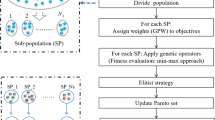Abstract
In this paper the problem of permutation flow shop scheduling with the objectives of minimizing the makespan and total flow time of jobs is considered. A Pareto-ranking based multi-objective genetic algorithm, called a Pareto genetic algorithm (GA) with an archive of non-dominated solutions subjected to a local search (PGA-ALS) is proposed. The proposed algorithm makes use of the principle of non-dominated sorting, coupled with the use of a metric for crowding distance being used as a secondary criterion. This approach is intended to alleviate the problem of genetic drift in GA methodology. In addition, the proposed genetic algorithm maintains an archive of non-dominated solutions that are being updated and improved through the implementation of local search techniques at the end of every generation. A relative evaluation of the proposed genetic algorithm and the existing best multi-objective algorithms for flow shop scheduling is carried by considering the benchmark flow shop scheduling problems. The non-dominated sets obtained from each of the existing algorithms and the proposed PGA-ALS algorithm are compared, and subsequently combined to obtain a net non-dominated front. It is found that most of the solutions in the net non-dominated front are yielded by the proposed PGA-ALS.
Similar content being viewed by others
References
Johnson SM (1954) Optimal two and three-stage production schedules with set-up times included. Naval Res Logist Q 1:61–68
Ignall E, Scharge L (1965) Application of the branch-and-bound technique to some scheduling problems. Oper Res 13:400–412
Campbell HG, Dudek RA, Smith ML (1970) A heuristic algorithm for the n-job, m-machine sequencing problem. Manage Sci 16:B630–B637
Gelders LF, Sambandam N (1978) Four simple heuristics for scheduling a flowshop. Int J Prod Res 16:221–231
Miyazaki S, Nishiyama N, Hashimoto F (1978) An adjacent pairwise approach to the mean flowtime scheduling problem. J Oper Res Soc Japan 21:287–299
Miyazaki S, Nishiyama N (1980) Analysis for minimizing weighted mean flowtime in flowshop scheduling. J Oper Res Soc Japan 23:118–132
Nawaz M, Enscore EE Jr, Ham I (1983) A heuristic algorithm for the m-machine, n-job flowshop sequencing problem. OMEGA 11:91–95
Widmer M, Hertz A (1989) A new heuristic method for the flowshop sequencing problem. Eur J Oper Res 41:186–193
Rajendran C (1995) Heuristics for scheduling in flowshop with multiple objectives. Eur J Oper Res 82:540–555
Ho JC (1995) Flowshop sequencing with mean flow time objective. Eur J Oper Res 81:571–578
Ishibuchi H, Murata T (1998) A multi-objective genetic local search algorithm and its application to flowshop scheduling. IEEE Trans Syst Man Cybern C 28:392–403
Wang C, Chu C, Proth J-M (1997) Heuristic approaches for n/m/F/∑Ci scheduling problems. Eur J Oper Res 96:636–644
Woo HS, Yim DS (1998) A heuristic algorithm for mean flowtime objective in flowshop scheduling. Comput Oper Res 25:175–182
Ben-Daya M, Al-Fawzan M (1998) A tabu search approach for the flowshop scheduling problem. Eur J Oper Res 109:88–95
Liu J, Reeves CR (2001) Constructive and composite heuristic solutions to the P//∑Ci scheduling problem. Eur J Oper Res 132:439–452
Nagar A, Heragu SS, Haddock J (1995) A branch and bound approach for a two-machine flowshop scheduling problem. J Oper Res Soc 46:721–734
Rajendran C (1993) Heuristic algorithm for scheduling in a flowshop to minimize total flowtime. Int J Prod Econ 29:65–73
Sridhar J, Rajendran C (1996) Scheduling in flowshop and cellular manufacturing systems with multiple objectives-a genetic algorithmic approach. Prod Plann Control 7:374–382
Daniels RL, Chambers RJ (1990) Multiobjective flowshop scheduling. Naval Res Logist 37:981–995
Bagchi TP (1999) Multiobjective scheduling by genetic algorithms. Kluwer, Boston
Chang P-C, Hsieh J-C, Lin SG (2002) The development of gradual priority weighting approach for the multi-objective flowshop scheduling problem. Int J Prod Econ 79:171–183
T’kindt V, Billaut J-C (2001) Multicriteria scheduling problems: a survey. RAIRO Oper Res 35:143–163
Murata T, Ishibuchi H, Tanaka H (1996) Multi-objective genetic algorithm and its applications to flowshop scheduling. Comput Ind Eng 130:957–968
Srinivas N, Deb K (1995) Multiobjective optimization using nondominated sorting in genetic algorithms. Evol Comput 2:221–248
Goldberg DE (1989) Genetic algorithms in search, optimization, and machine learning. Addison-Wesley, Reading, MA
Gen M, Cheng R (2000) Genetics algorithms & engineering optimization. Wiley, New York
Taillard E (1993) Benchmarks for basic scheduling problems. Eur J Oper Res 64:278–285
Author information
Authors and Affiliations
Corresponding author
Rights and permissions
About this article
Cite this article
Pasupathy, T., Rajendran, C. & Suresh, R. A multi-objective genetic algorithm for scheduling in flow shops to minimize the makespan and total flow time of jobs. Int J Adv Manuf Technol 27, 804–815 (2006). https://doi.org/10.1007/s00170-004-2249-6
Received:
Accepted:
Published:
Issue Date:
DOI: https://doi.org/10.1007/s00170-004-2249-6




